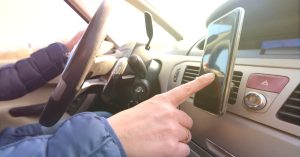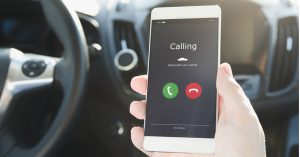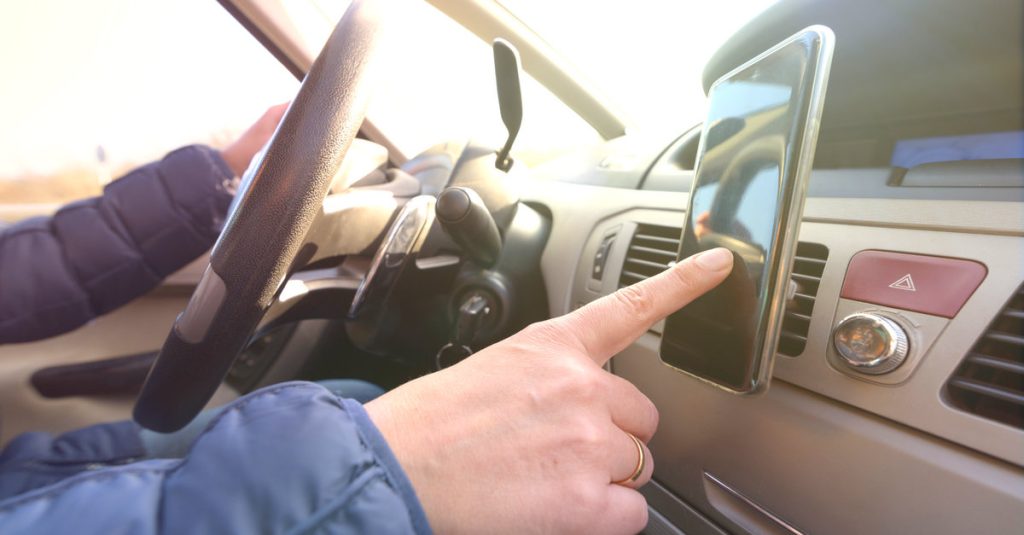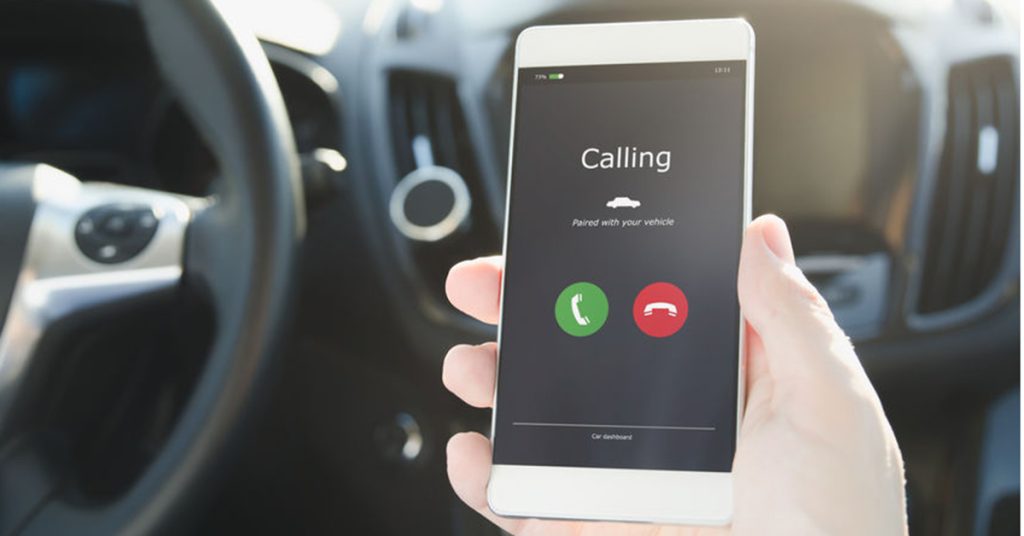Posts Tagged ‘Massachusetts car accident attorneys’
Proposal to Strengthen Massachusetts Hands-Free Driving Law By Adding Ban on Recording and Broadcasting While Driving

Drivers are not allowed to pick up cell phones under the Massachusetts hands-free driving law, but can quickly tap the device for activation of hands-free mode or GPS.
A dangerous trend has emerged on our roads, cell phones and social media accounts, with the rise of drivers “vlogging,” live-streaming and making video phone calls. In a 2020 survey, more than 20 percent of drivers admitted to recording video on cell phones. This is more than double the response from 2015.
Now, after a cyclist’s tragic death, a local lawmaker is proposing Massachusetts update its hands-free driving law to ban both recording and broadcasting video while driving.
Nationwide, 48 states have banned texting while driving and 24 states have passed hands-free driving laws, according to the Governors Highway Safety Association.
Massachusetts would join four other states which have banned recording and broadcasting as part of their hands-free laws, according to state Sen. Jo Comerford, D-Northampton, who has proposed the legislation.
Sen. Comerford proposed “Charlie’s Law” in the wake of a cyclist’s death near Northampton High School in October 2021. A 23-year-old driver is accused of video chatting on the FaceTime app, then running past a stop sign and striking the cyclist in a fatal bike crash, according to local news reports. The driver now faces criminal charges, including negligent motor vehicle homicide. Meanwhile, state lawmakers held the first hearing on Charlie’s Law earlier this month.
Background on Massachusetts Distracted Driving Laws
Looking to prevent injuries and deaths in car accidents, Massachusetts passed a ban on texting while driving in 2010. After many years of debate, lawmakers reached agreement on a more comprehensive hands-free driving law in 2019.
The Massachusetts hands-free driving law took effect in early 2020 and drivers now face fines for violations, starting with $100 for the first offense.
For third and subsequent offenses, drivers face up to $500 in fines and an insurance surcharge. They must also attend a distracted driving education program.
Under the hands-free law, drivers are only allowed to touch mobile phones and electronic devices to quickly activate hands-free mode, when devices are mounted to a windshield, dashboard or center console. Drivers are still allowed to use voice-to-text commands and make phone calls so long as cell phones are properly mounted.
As it stands, the Massachusetts hands-free driving law does not specifically ban drivers from making video conference calls or vlogging activities, such as recording or live broadcasting video of one’s self while driving to post on social media sites. As long as cell phones are mounted, drivers are not violating the law.
Drivers may be cited or charged if police investigate a car crash and find they violated another traffic law, such as a marked lanes violation. But updating the hands-free law – which is a primary enforcement law – may allow police to stop and cite drivers they see using cell phone video features before a crash happens.
Sen. Comerford has proposed S. 2733, “An Act Prohibiting Video Recording or Broadcasting While Driving.” The bill proposes adding language to the existing law stating no operator shall record or broadcast video of themselves on a mobile device, with a few exceptions.
- Drivers would still be allowed to record or broadcast video in an “emergency or exigent circumstance” or “when it is so clearly in the public interest as to override the public safety purpose of this sentence.”
- Dash cams can still be used to record traffic conditions or passengers in a vehicle, but they must be mounted. This allows commercial drivers, Uber and Lyft drivers to continue recording passenger behavior.
More Than Twice As Many Drivers Admitted to Recording While Driving in 2020
In its 2021 Driving While Distracted study, State Farm Auto Insurance reported 22 percent of drivers admitted to recording behind the wheel in 2020, compared to 10 percent in 2015.
Younger drivers were more likely to engage in this behavior:
- Nearly half – 44 percent – of drivers in the 18 to 29-year-old demographic admitted to recording video while driving.
- More than a third of drivers age 30 to 39 admitted the same.
This was not the only increase. State Farm reported 89 percent of drivers – or nearly 9 out of 10 – admitted to engaging in one of the 14 distracted driving behaviors covered in its online survey.
One troubling note was most drivers in states which had passed hands-free driving said they were aware of laws, but one in five were not informed. Six percent of the drivers even said their state did not ban handheld cell phone use.
Contact Breakstone, White & Gluck For a Free Legal Consultation – Boston Personal Injury and Car Accident Attorneys
At Breakstone, White & Gluck, our Boston personal injury lawyers offer more than 100 years combined experience representing those injured by negligent and reckless driving. Our attorneys work with clients throughout the Boston area, including those who live and work in Boston, Cambridge, Somerville, Everett, Brookline, Arlington and Quincy.
If you have been injured in a car accident caused by another driver’s negligence, you may require medical care and have to miss time at work. You may have many questions. For a free legal consultation, contact Breakstone, White & Gluck at 800-379-1244 or use our contact form. Our attorneys will review the facts of your case with you and help you determine whether you have a potential claim.
Backover Accidents Endanger Children
 It is frightening to watch a driver back up toward a child at play. At least 50 children are victims of backover accidents each week, according to KidsandCars.org. More than 70 percent of backover accidents involve young children and a parent or a relative. Many of these car accidents occur right in home driveways.
It is frightening to watch a driver back up toward a child at play. At least 50 children are victims of backover accidents each week, according to KidsandCars.org. More than 70 percent of backover accidents involve young children and a parent or a relative. Many of these car accidents occur right in home driveways.
As traumatic as backover accidents are, many injuries are preventable. Drivers can recognize the safety risk and make use of technology. Families can communicate and plan. Involve friends and family who visit and park at your home in this conversation. Before they arrive, suggest a safe parking space.
As a Massachusetts driver, you can help prevent backover accidents through a combination of steps. You can use a back-up camera. Stay aware of your blind zone. Near children, the most effective prevention may be getting out and walking around your vehicle. Make sure you have a clear path of travel and if you don’t, be patient. Stay where you are for an extra few minutes until the children have gone back inside.
For Families:
Comings and Goings. Start by keeping your family together when someone arrives and departs. Keep children inside and let them wave to the driver from the window. If children are outside, an adult should be outside supervising them. Gather together on the front steps or a safe place. Hold on basketball, bikes or riding toys until the person leaves. It’s hard for a young child to resist chasing a ball.
Driveway Barriers. Parents can keep traffic cones in the shed. Put the cones out in your driveway when you are concerned or to block delivery drivers from pulling. You can also look into portable neon driveway fencing products.
For Drivers:
Walk Around the Vehicle. Even if drivers have a back-up camera, walk around your vehicle. Check underneath your vehicle and observe if a child or anyone is nearby or may move into your path of travel (such as a child riding a bike or someone pushing a shopping cart).
Park Consistently. If you are a parent or live near children, park your vehicle in the same place in your driveway or garage each day. Be consistent with your approach. Whether you pull in or back into your driveway or garage, make sure children are in a safe place. If you are a parent, keep children in the backseat if you back in. Come to a complete stop, turn and check on your children in the backseat, then get out of the vehicle together.
Large Vehicles. Trucks, SUVs, RVs and vans are more likely to cause backover crashes, according to NHTSA. The taller the vehicle, the greater the driver’s blind zone.
Blind Zone. The blind zone is the area behind a vehicle which a driver can’t see. Whatever vehicle you drive, learn about your blind zone. Consumer Reports found small sedans usually have a 12 foot blind zone for the average driver. Midsized SUVs have an 18-foot blind zone, while large SUVs have 19 feet. Pick-up trucks have the largest blind zone among the passenger vehicles – 24 feet.
Back-up Cameras. As of May 2018, all new passenger cars, trucks, vans and other vehicles weighing less than 10,000 pounds have to be outfitted with rearview monitoring technology, according to Edmunds.com. If you are driving an older vehicle, you can install a back-up camera on your own – and it is an important tool which can save lives. Read “How to Add a Backup Camera to Your Car,” by Consumer Reports.
Bicycles and Pedestrians. Backover accidents can also injure adults, including cyclists and pedestrians. Look all around your vehicle before you pull out of a parking space. Be aware of different types of activities and movements in downtown and other business areas. When possible, avoid parking near crosswalks.
Parking Lot Crashes. In parking lots, pull into parking spaces whenever possible. Keep watch of pedestrians and shoppers when you pull out or back out of spaces. Set aside cell phones and do not drive when you are overfatigued.
Another note is right now, many Massachusetts grocery stores, retailers and restaurants are offering curbside pick-up services. While convenient, remember not every business is experienced with this. Drive into parking lots slowly and watch for curbside pick-up signs. If there are no signs, find a parking space and call the store. Always watch for pedestrians, who are also just figuring this all out.
Boston Car Accident Lawyers – Free Legal Consultation
At Breakstone, White & Gluck, our Boston car accident attorneys specialize in representing victims of car accidents and pedestrian accidents. We represent those injured across Massachusetts, from Boston and Cambridge to the North Shore to Quincy and the South Shore and Cape Cod.
For a free legal consultation, contact our attorneys at 800-379-1244 or 617-723-7676 or use our contact form.
Massachusetts Hands-Free Law Update: Fines Can Begin April 1, 2020

The Massachusetts hands-free driving law bans this action. Fines start today, April 1, 2020.
As of today April 1, Massachusetts police departments can start to issue citations and fines to drivers who violate the Massachusetts hands-free driving law. We encourage you to follow the Massachusetts COVID-19 “Stay at Home” advisory. But if you have to go out, you can help yourself drive more safely and avoid a fine by checking that your car is set up for hands-free mode. Even better? Read this update, but turn off your cell phone while driving. Many of us are exhausted and out-of-routine. Focus on the roads and what you need to get done, so you can get back home.
So far, many drivers are still picking up phones, despite the new law. During the initial grace period from Feb. 23-Mar. 31, police issued 4,500 written warnings across Massachusetts, according to a state official interviewed by WGBH. The official said drivers must become aware of both the law and that police are watching.
“…the police officers I’ve talked to seem to say that everyone who is pulled over says, “Yes, I’ve heard about it. Sorry. My mistake,” said Jeff Larason, director of highway safety at the Massachusetts Executive Office of Public Safety. (Listen to the WGBH segment in full).
Massachusetts passed a texting while driving law in 2010 but lawmakers spent nearly 10 years debating the handheld cell phone ban.
The Massachusetts hands-free driving law was passed by the Massachusetts Legislature in November 2019 and quickly signed by Gov. Charlie Baker on Nov. 29. To help drivers get ready, the state granted an initial grace period. Larason told WGBH 4,500 drivers had received written warnings (broadcast date: March 13). The Boston Globe reported State Police had issued 578 warnings to drivers, in just the first week. On Cape Cod, local police reported 150 verbal or written warnings in the first week (Source: South Coast Today via Cape Cod Times).
What the law allows and bans:
- The law states drivers cannot use any electronic device, including mobile telephones, unless the device is being operated in hands-free mode.
- Drivers can only touch cell phones and mobile phones once to activate hands-free mode.
- Cell phones must be properly mounted to the windshield, dashboard or center console and not impede with operation. This is the only way drivers are allowed to use GPS or voice to text technology such as Bluetooth.
- Drivers are specifically not allowed to touch phones for texting and emailing. Use of apps, video or Internet is also prohibited.
- Drivers who are 18 and younger are not allowed to use cell phones behind the wheel. Hands-free is illegal and can result in violation of their Massachusetts Junior Operator’s License.
- You may be stopped. But you are not allowed to pick up your phone at red lights or stop lights.
- You can pick up your cell phone and make a call if you are in a stationary position, outside a travel lane or bicycle lane.
- There is also an exemption for emergency professionals who need to pick up the phone for calls and those calling 911. 911 calls must be taken seriously. The state advises drivers to make every attempt to pull over before calling 911 – even if you are in hands-free mode.
Violations of the Massachusetts Hands-Free Driving Law
Police in Massachusetts can now start issuing tickets. Here are the penalties:First offense: $100 fine.
Second offense: $250 fine and distracted driving education.
Third offense: $500 fine and distracted driving education.
With a third offense, you may face an insurance surcharge.
Related:
Massachusetts hands-free driving law, Mass.gov
Breakstone, White & Gluck – Boston Personal Injury Lawyers: 800-379-1244
With more than 100 years combined experience, Breakstone, White & Gluck specializes in representing plaintiffs in personal injury cases involving car accidents, truck accidents, pedestrian accidents and bicycle accidents. Our attorneys have extensive experience handling cases for clients injured by negligent use of cell phones and texting while driving. We represent clients across the state of Massachusetts in car accident cases, including in Boston, the North Shore, the South Shore and Cape Cod.
We are open and working remotely for our clients during the state’s COVID-19 advisories. If you have been injured, we are providing free legal consultations at 800-379-1244 or 617-723-7676. You can also use our contact form.




